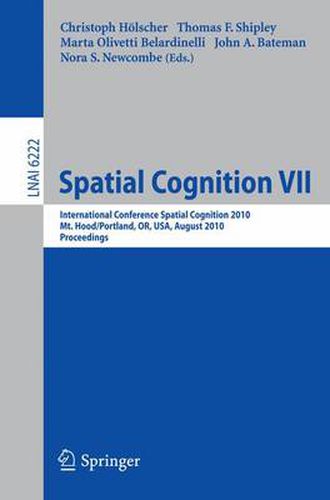Readings Newsletter
Become a Readings Member to make your shopping experience even easier.
Sign in or sign up for free!
You’re not far away from qualifying for FREE standard shipping within Australia
You’ve qualified for FREE standard shipping within Australia
The cart is loading…






This title is printed to order. This book may have been self-published. If so, we cannot guarantee the quality of the content. In the main most books will have gone through the editing process however some may not. We therefore suggest that you be aware of this before ordering this book. If in doubt check either the author or publisher’s details as we are unable to accept any returns unless they are faulty. Please contact us if you have any questions.
This is the seventh volume of a series of books on fundamental research in spatial cognition. As with past volumes, the research presented here spans a broad range of research traditions, for spatial cognition concerns not just the basic spatial behavior of biological and artificial agents, but also the reasoning processes that allow spatial planning across broad spatial and temporal scales. Spatial information is critical for coordinated action and thus agents interacting with objects and moving among objects must be able to perceive spatial relations, learn about these relations, and act on them, or store the information for later use, either by themselves or communicated to others. Research on this problem has included both psychology, which works to understand how humans and other mobile organisms solve these problems, and computer science, which considers the nature of the information available in the world and a formal consideration of how these problems might be solved. Research on human spatial cognition also involves the application of representations and processes that may have evolved to handle object and location information to reasoning about higher-order problems, such as displaying non-spatial information in diagrams. Thus, work in s- tial cognition extends beyond psychology and computer science into many disciplines including geography and education. The Spatial Cognition conference offers one of the few forums for consideration of the issues spanning this broad academic range.
$9.00 standard shipping within Australia
FREE standard shipping within Australia for orders over $100.00
Express & International shipping calculated at checkout
This title is printed to order. This book may have been self-published. If so, we cannot guarantee the quality of the content. In the main most books will have gone through the editing process however some may not. We therefore suggest that you be aware of this before ordering this book. If in doubt check either the author or publisher’s details as we are unable to accept any returns unless they are faulty. Please contact us if you have any questions.
This is the seventh volume of a series of books on fundamental research in spatial cognition. As with past volumes, the research presented here spans a broad range of research traditions, for spatial cognition concerns not just the basic spatial behavior of biological and artificial agents, but also the reasoning processes that allow spatial planning across broad spatial and temporal scales. Spatial information is critical for coordinated action and thus agents interacting with objects and moving among objects must be able to perceive spatial relations, learn about these relations, and act on them, or store the information for later use, either by themselves or communicated to others. Research on this problem has included both psychology, which works to understand how humans and other mobile organisms solve these problems, and computer science, which considers the nature of the information available in the world and a formal consideration of how these problems might be solved. Research on human spatial cognition also involves the application of representations and processes that may have evolved to handle object and location information to reasoning about higher-order problems, such as displaying non-spatial information in diagrams. Thus, work in s- tial cognition extends beyond psychology and computer science into many disciplines including geography and education. The Spatial Cognition conference offers one of the few forums for consideration of the issues spanning this broad academic range.